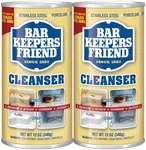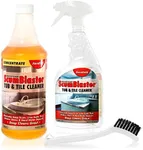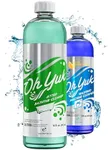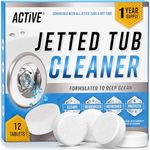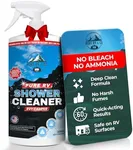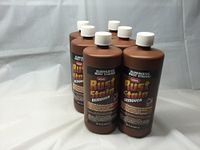Buying Guide for the Best Rust Cleaner For Bathtub
Choosing the right rust cleaner for your bathtub is essential to ensure effective cleaning without damaging the surface. Rust cleaners come in various formulations and strengths, and selecting the right one depends on the type of rust, the material of your bathtub, and your cleaning preferences. Understanding the key specifications will help you make an informed decision and achieve the best results.FormulationThe formulation of a rust cleaner refers to its chemical composition. This is important because different formulations are designed to tackle different levels of rust and types of surfaces. There are generally three types: acidic, neutral, and natural. Acidic cleaners are very strong and effective but can be harsh on certain materials. Neutral cleaners are less aggressive and safer for a variety of surfaces. Natural cleaners use ingredients like vinegar or lemon juice and are eco-friendly but may require more effort. Choose a formulation based on the severity of the rust and the material of your bathtub. For heavy rust on durable surfaces, an acidic cleaner might be best. For lighter rust or delicate surfaces, a neutral or natural cleaner is preferable.
Surface CompatibilitySurface compatibility indicates whether the rust cleaner is safe to use on your bathtub material. This is crucial to avoid damaging the surface while removing rust. Bathtubs can be made from materials like porcelain, acrylic, fiberglass, or cast iron. Some cleaners are multi-surface and safe for all types, while others are specifically formulated for certain materials. Always check the label to ensure the cleaner is compatible with your bathtub. If you have a delicate or high-end bathtub, opt for a cleaner that explicitly states it is safe for that material.
Application MethodThe application method refers to how the rust cleaner is applied to the surface. This can affect the ease of use and effectiveness. Common methods include sprays, gels, and liquids. Sprays are convenient and easy to apply evenly, making them ideal for large areas. Gels stick to surfaces longer, providing more contact time for tough rust stains. Liquids can be versatile but may require more effort to apply evenly. Choose an application method that suits your cleaning style and the size of the area you need to treat. For quick and easy application, a spray might be best. For stubborn rust, a gel could be more effective.
Toxicity and SafetyToxicity and safety refer to the potential health risks associated with using the rust cleaner. This is important for your health and the environment. Some rust cleaners contain harsh chemicals that can be harmful if inhaled or come into contact with skin. Others are formulated to be non-toxic and biodegradable. If you have children, pets, or are sensitive to chemicals, look for a rust cleaner that is labeled as non-toxic and safe for use around the home. Always follow the safety instructions on the label, and consider wearing gloves and ensuring good ventilation when using stronger cleaners.
EffectivenessEffectiveness measures how well the rust cleaner removes rust stains. This is the primary function of the product, so it’s crucial to choose one that works well. Effectiveness can vary based on the formulation and the severity of the rust. Some cleaners are designed for light rust and may not work on heavy stains, while others are industrial-strength and can handle severe rust. Read reviews and product descriptions to gauge the effectiveness. If you have heavy rust stains, look for a cleaner with strong reviews for tough rust removal. For light stains, a milder cleaner should suffice.
